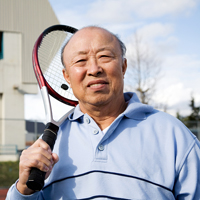 As we get older, rotator cuff injuries become more common, a result of the natural aging process. A similar mechanism operates in the discs separating the vertebras in your lower back. These cartilaginous structures lose water over time, becoming less flexible and more brittle as the decades roll by. In the case of the shoulder, the rotator cuff tendon is pulleyed to and fro as the arm swings forward and back and up and down. As the years pass, this constant motion may cause fraying in the rotator cuff tendon and inflammation in the muscles that comprise the rotator cuff. Eventually, partial or full thickness tears may develop in one or more of these musculotendinous units, causing pain and some loss of function. Importantly, conservative care may be all that’s needed to reduce pain and restore needed motion. The shoulder joint is beautifully designed and a marvel of engineering. Its construction makes possible a full 360-degree arc of motion in both the sagittal and frontal planes. In other words, you can swing your arm in a complete circle from front-to-back and to-the-side-and-up-and-around. In the third, horizontal, plane, 180 degrees of motion is available. The overall combination of movements in three-dimensional space makes the shoulder joint the most freely movable joint in your body. However, as with all freedoms we enjoy in this life, there is a price. The shoulder joint’s great mobility is countered by its very limited stability. The shoulder’s lack of stability needn’t concern us in our average day-to-day tasks. Protection to the joint is built-in by way of the rotator cuff muscles, which form a strong hood that envelops the intersection of the arm bone and shoulder blade. Falling on an outstretched arm may result in a dislocated shoulder, so we need to have some care in this regard. If you’re a young athlete and have suffered a rotator cuff tear, surgery may be an appropriate option.1 But for the vast majority of people, especially for those over age 40, most rotator cuff injuries are chronic rather than acute and can be treated with rest and rehabilitative exercise. Again, if you’re a 60-year-old skier who has torn his or her rotator cuff in a downhill accident, surgery could be indicated. For the rest of us, rehabilitative exercise is the key.2,3 Four or five primary strength training exercises are involved in shoulder or rotator cuff rehabilitation. The three basic shoulder exercises are (1) seated overhead press, which trains all the shoulder girdle muscles simultaneously; (2) standing side [lateral] raise; and (3) seated or standing bent-over raise. The lateral raise specifically trains the middle deltoid muscle and the bent-over raise specifically trains the posterior deltoid muscle. Specific rotator cuff strength training exercises include internal rotation and external rotation on a flat bench using very light dumbbells. More painful injuries with greater loss of mobility may require (1) Codman pendulum exercises and (2) finger-walking (up a wall) to the front and to the side. The goals of rotator cuff rehabilitation, as for any mechanical injury, include decreased inflammation, decreased pain, return to more full active range of motion, return to more full muscular strength, and restoration of function. Call your Elkhorn Family Chiropractor today! 1 Plate JF, et al: Rotator cuff injuries in professional and recreational athletes. J Surg Orthop Adv 22(2):134-142, 2013 2 Escalmilla RF, et al: Optimal management of shoulder impingement syndrome. Open Access J Sports Med 5:13-24, 2014 3 McMahon PJ, et al: What Is the Prevalence of Senior-athlete Rotator Cuff Injuries and Are They Associated With Pain and Dysfunction? Clin Orthop Relat Res 2014 Mar 12. [Epub ahead of print]
0 Comments
Leave a Reply. |
blogRead our posts and join the conversation by commenting or sharing with community. categories
All
archives
October 2023
|
Elkhorn WIhoursMONDAY: 2-6
TUESDAY: 9-12 + 3-7 WEDNESDAY: 2-6 THURSDAY: 3-7 FRIDAY: 9-12 SATURDAY: 9-12 |
Johnson Creek WIhoursMONDAY: 2-6
TUESDAY: 2-6 WEDNESDAY: 2-6 THURSDAY: CLOSED FRIDAY: 2-6 SATURDAY: CLOSED |
subscribe to our emails |


 RSS Feed
RSS Feed